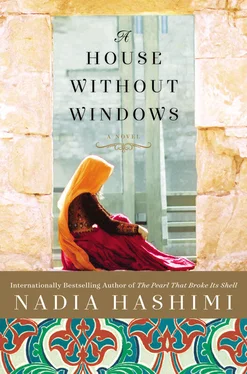Basir shrugged his shoulders, and Gulnaz waited patiently. Something was coming to the surface, and she needed to hear it. The buzz of the main road filled the silence as Basir chose his words carefully.
“I. . I feel like she’s angry with me. She doesn’t let me near her daughters and sometimes she. . she doesn’t even let me near Kareema or Shabnam. She keeps them all in one room with her at night. They’re scared, Bibi- jan . I know I’m supposed to look after them and Rima, too, but she acts like. . she screams at me sometimes to get away from them. It’s easier for me to be out of the house. That’s why she didn’t even realize I’d gone to the shrine to visit my mother. I sleep in the courtyard most nights, but I don’t mind it. I don’t mean to complain.”
He was carefully reeling in his words, as if nervous that he might be making his situation worse by saying them.
Gulnaz bit her lip. She thought back to what Tamina had said in those few angry moments.
“Oh dear Allah,” she breathed with a hand over her mouth. She turned her back to Basir as the truth hit her. Tamina’s anger hadn’t come from a sense of mourning. She’d not said a single word about losing Kamal or about Kamal being killed senselessly. Tamina, who had lived with her brother every day of her life until she was married, was only angry at what had been done to her family, not to her brother.
She did not trust Basir because Tamina could never trust the son of Kamal. Tamina had no love for her brother. Every cell of her body had seethed with resentment that Gulnaz should have recognized, but she’d not wanted to believe that evil could run so deep. How could she have been so blind?
Basir watched her mutely. It was not his fault that he looked dark with guilt, Gulnaz wanted to tell him. It was the color of the sky reflecting on him. It was completely out of his hands.
“Bibi- jan .”
Gulnaz nodded. This was the truth. This had always been the truth. What had Zeba’s life been? What had her granddaughters suffered? Gulnaz felt ill, as if the contents of her stomach might empty into the street if she let herself think of it a moment longer.
She cleared her throat and choked back tears. She looked at Basir who was pressing the heels of his palms against his eyes with all the stoicism he could gather. How much did he really know? How much of what he felt was just that — feeling?
“We’ve got to get you back,” Gulnaz said, curling a loving arm around her grandson’s hunched shoulders. His head leaned into her as he would have leaned into his mother if she could have been here at this moment. At least Tamina’s house was a safe place for her grandchildren. Tamina would let nothing happen to the children. She wouldn’t let Kamal reach from the grave and violate her peace. Not again.
ZEBA WAS AWAKENED BY THE FEELING THAT SOMEONE WAS standing over her.
“Zeba- jan, what can I do but pray over you?” a shadow whispered. “Gulnaz is right, even if it pains me to admit it. This is no place for you.”
Zeba’s tongue felt thick and heavy in her mouth.
“You. . what do you want with my mother?”
“Drink this,” the mullah said as he handed her a bowl of broth. Zeba heard the clink of bones against ceramic, greasy steam rising into her face. He nudged the dish toward her lips and barely flinched when she batted it away violently. Though her eyes had not yet adjusted, Zeba could tell that his clothes were wet with hot soup, the smell of salt and onions mixing with his sweat.
Zeba waited for the mullah to strike her, to yank her up by the hair the way a toddler lifts a doll — he did not.
“What did you do to my mother?” she asked; her question had gone unanswered the last time she’d seen him.
“I wish things could have gone differently. I’m an old man now and I’m looking back at my family and wondering if I made the right choices for my children. I’m still not sure.”
“My children,” Zeba whispered, speaking more to the night than the mullah. “My daughter Rima should be taking her first steps with my hand to hold her up.”
“She might be running.” Habibullah sighed. “Children have a way of moving on even after they lose a parent.”
That, Zeba thought to herself, was the kind of foolishness only a man would speak.
“Your boy looks content. He follows you. He respects you and, more important, he does not fear you. That’s why I thought you to be a decent man before you dared put your hands on my mother.”
The mullah went quiet. The three-quarter moon cast pillars of light high into the sky. The mullah was crouched at the mouth of her cell, pressing his eyes with his thumb and pointer finger.
“I am old,” he said finally. “I am too old and too tired to be anything but this. Your mother looks like she could be your sister. She’s the only one time hasn’t touched in this entire country. I am not surprised. She is so unyielding, she puts the mountains to shame.”
“You dare to speak as if you know her.”
“Once upon a time, I knew her very well. Once upon a time, I took her as my bride.”
Zeba sat straight up. If this were a dream, she would have to shake herself from its grip before it went further.
“What are you saying?” she demanded, her voice uneven.
The mullah nodded solemnly. Zeba stared at him and traced time backward, undoing his beard and the grays of his hair. She looked into his eyes and followed the shape of his nose and shoulders.
“You. . you are not dead?”
“Not yet, janem, ” he answered flatly. Zeba’s heart skipped. She fought the urge to let out a cry, to put her hands on his face. She focused on her breathing, closing her eyes as she whispered the question she’d asked so many, many times.
“Where were you?”
Zeba wondered if he would name a single place, as if a geographic location would do anything to explain a lifetime of absence.
“I went everywhere. I became a nomad.”
“I prayed for you.”
Zeba thought of the many times she’d gazed fearfully at the mountains to the east and thought of the four hundred twenty-three rickety wooden steps that linked their province to the next. Many had died there, she’d learned even as a child, losing their foothold or frozen with fright. She’d prayed to God that her father not be at the bottom of a ravine.
“I had to leave, Zeba. It was the best thing I could do — to free us both.”
“The boy. . you have a family now?”
The mullah shrugged.
“I did what any man would have done. I married and began again.”
Zeba blinked rapidly. It sounded so easy, like putting one book down and opening another. But it made sense to her, too, because she was not completely unlike this man. She, too, had turned her back on Gulnaz.
There was a new, spectacular lightness in her chest. Zeba sighed. It seemed she was only as crazy as her parents had made her.
“Sing to me,” she said to the man who’d left her so long ago. It seemed like a small request to make while she sorted out whether to love or hate him.
His voice, thick with nostalgia and with a rasp that showed his years, broke the silence of the heartbreaking night. They were two forlorn beings, the distance between them dissolving under the twinkling of the stars. They did not look at each other.
“ Tonight, you will listen to the sorrows of my soul, ” he croaked. “ Though tomorrow, you will forget all that has been told. ”
Zeba’s father touched the top of her head. His thumb rested on her widow’s peak, the very center of her forehead, and she felt like he was reaching into her soul.
His song floated into the night. It was a confession. It was a prayer. Zeba raised her voice with his even as the tears slid down her cheeks.
Читать дальше











